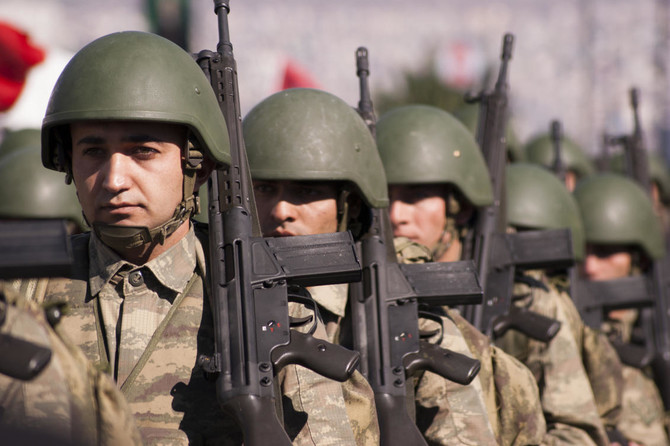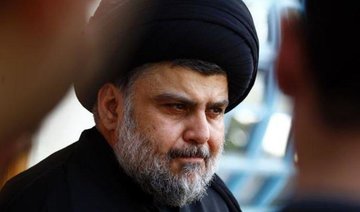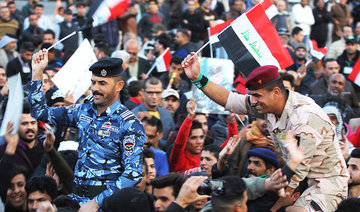ANKARA: Senior Turkish, Iraqi and US military officials met in Ankara on Thursday to discuss regional developments and security challenges.
Turkish Chief of General Staff Gen. Hulusi Akar, his Iraqi counterpart Othman Al-Ghanimi, Commander of US European Command (EUCOM) Curtis Scaparrotti and Commander of US Central Command (CENTCOM) Joseph Votel attended the meeting.
The focus was on Iraq, Syria and counterterrorism efforts, said the Turkish General Staff. The meeting comes six days after Baghdad’s announcement of the total defeat of Daesh in Iraq.
The main items on the agenda were the need to prevent the emergence of any terror movements post-Daesh, and recent US promises to stop delivering weapons to the Syrian-Kurdish People’s Protection Units (YPG) and take back heavy weapons already delivered.
Turkey is part of EUCOM, and has long provided its southern Incirlik base for anti-Daesh airstrikes by the US-led coalition, thereby assisting CENTCOM. Both Turkey and the US have military bases in Iraq.
“The US wants to see Turkey and Iraq on its side against terrorism,” Nursin Atesoglu Guney, dean of the faculty of economics, administrative and social sciences at Bahcesehir Cyprus University, told Arab News.
“But Turkey’s priority is now the elimination of the YPG, seen by Ankara as an offshoot of the outlawed PKK (Kurdistan Workers’ Party) terror group.”
Washington does not want to push Ankara away, and intends to pull Baghdad away from Tehran, she said.
“For this, the US uses counterterrorism cooperation as a general framework for regional cooperation,” she added.
Defense Secretary Jim Mattis recently said the US would stop arming the YPG, its main local partner in Syria.
Ankara’s main concern is that weapons supplied to the YPG will end up in PKK hands in Turkey.
Erol Bural, a former military officer and a terrorism expert at the 21st Century Turkey Institute, said Ankara and Washington regularly hold security meetings.
“But the inclusion of Iraq in this framework shows that the meeting essentially focused on Iraq’s security post-Daesh,” Bural told Arab News.
“It’s clear that there’s an effort to continue the US-Turkish relationship through military channels, as the political channels are currently blocked.”
Bural said he does not expect a joint operation against PKK militants in Iraq in the short or medium term, as this requires further coordination and an improvement in relations between Ankara and Baghdad.
“But they can take steps to ease and accelerate airspace usage to conduct airstrikes against PKK hideouts in Iraq,” he said.
“Post-Daesh, the common security concern of the three countries may be the possibility of a Daesh comeback or the emergence of similar radical terror organizations.”
Accordingly, Bural said the three countries should boost border security and intelligence sharing against the PKK and other terror organizations.
“It’s also important to take proactive steps to counter violent extremism in the region,” he added.
Turkish, US, Iraqi military officials discuss security challenges
Turkish, US, Iraqi military officials discuss security challenges

After Ocalan visit, Turkiye opposition MPs brief speaker, far-right leader

ISTANBUL: A delegation from Turkiye’s pro-Kurdish opposition DEM party met Thursday with the parliamentary speaker and far-right MHP leader amid tentative efforts to resume dialogue between Ankara and the banned PKK militant group. DEM’s three-person delegation met with Speaker Numan Kurtulmus and then with MHP leader Devlet Bahceli.
The aim was to brief them on a rare weekend meeting with Abdullah Ocalan, the jailed founder of the Kurdistan Workers’ Party who is serving life without parole on Imrali prison island near Istanbul.
It was the Ocalan’s first political visit in almost a decade and follows an easing of tension between Ankara and the PKK, which has waged a decades-long insurgency on Turkish soil and is proscribed by Washington and Brussels as a terror group.
The visit took place two months after Bahceli extended a surprise olive branch to Ocalan, inviting him to parliament to disband the PKK and saying he should be given the “right to hope” in remarks understood to moot a possible early release.
Backed by President Recep Tayyip Erdogan, the tentative opening came a month before Syrian rebels began a lightning 12-day offensive that ousted Bashar Assad in a move which has forced Turkiye’s concerns about the Kurdish issue into the headlines.
During Saturday’s meeting with DEM lawmakers Sirri Sureyya Onder and Pervin Buldan, Ocalan said he had “the competence and determination to make a positive contribution to the new paradigm started by Mr.Bahceli and Mr.Erdogan.”
Onder and Buldan then “began a round of meetings with the parliamentary parties” and were joined on Thursday by Ahmet Turk, 82, a veteran Kurdish politician with a long history of involvement in efforts to resolve the Kurdish issue.
Iraq’s Sulaimaniyah city bans groups accused of PKK links

SULAIMANIYAH: Authorities in the Iraqi Kurdish city of Sulaimaniyah have banned four organizations accused of affiliation with the Turkish-blacklisted Kurdistan Workers Party, activists said Thursday, denouncing the move as “political.”
The four organizations include two feminist groups and a media production house, according to the METRO center for press freedoms which organized a news conference in Sulaimaniyah to criticize the decision.
PKK fighters have several positions in Iraq’s northern autonomous Kurdistan region, which also hosts Turkish military bases used to strike Kurdish insurgents.
Ankara and Washington both deem the PKK, which has waged a decades-long insurgency in Turkiye, a terrorist organization.
Authorities in Sulaimaniyah, the Iraqi Kurdistan region’s second city, have been accused of leniency toward PKK activities.
But the Iraqi federal authorities in Baghdad have recently sharpened their tone against the Turkish Kurdish insurgents.
Col. Salam Abdel Khaleq, the spokesman for the Kurdish Asayesh security forces in Sulaimaniyah, told AFP that the bans came “after a decision from the Iraqi judiciary and as a result of the expiration of the licenses” of these groups.
Israeli military says commandos raided missile plant in Syria in September

JERUSALEM: Israel’s military said on Thursday its special forces raided an underground missile production site in Syria in September that it said was primed to produce hundreds of precision missiles for use against Israel by the Iranian-backed Hezbollah.
The complex near Masyaf, in Hama province close to the Mediterranean coast, was “the flagship of Iranian manufacturing efforts in our region,” Israeli military spokesperson, Lt. Col. Nadav Shoshani told a briefing with reporters.
“This facility was designed to manufacture hundreds of strategic missiles per year from start to finish, for Hezbollah to use in their aerial attacks on Israel,” he said.
He said the plant, dug into the side of a mountain, had been under observation by Israeli intelligence since construction work began in 2017 and was on the point of being able to manufacture precision-guided long-range missiles, some of them with a range of up to 300 km (190 miles).
“This ability was becoming active, so we’re talking about an immediate threat,” he said.
Details of the Sept. 8 raid have been reported in the Israeli media in recent days but Shoshani said this was the first confirmation by the military, which usually does not comment on special forces operations of this type.
At the time, Syrian state media said at least 16 people were killed in Israeli airstrikes in the west of the country.
Shoshani said the hours-long nighttime raid was “one of the more complex operations the IDF has done in recent years.” Accompanied by airstrikes, it involved dozens of aircraft and around 100 helicopter-borne troops, who located weapons and seized documents, he said.
“At the end of the raid, the troops dismantled the facility, including the machines and the manufacturing equipment themselves,” he said, adding that dismantling the plant was “key to ensure the safety of Israel.”
Israeli officials have accused the former Syrian government of President Bahar Assad of helping the Lebanese-based Hezbollah movement receive arms from Iran and say they are determined to stop the flow of weapons into Lebanon.
As Bashar Assad’s government crumbled toward the end of last year, Israel launched a series of strikes against Syrian military infrastructure and weapons manufacturing sites to ensure they did not fall into the hands of its enemies.
Israel says struck Hezbollah rocket launchers in south Lebanon

- Israeli military said Thursday’s strike targeted medium-range rocket launchers in the Nabatieh area
JERUSALEM: The Israeli military said it struck Hezbollah rocket launchers in south Lebanon on Thursday, despite a fragile ceasefire with the militant group.
The truce, which took effect on November 27, has been marked by mutual accusations of violations from both sides.
The Israeli military said Thursday’s strike targeted medium-range rocket launchers in the Nabatieh area.
Lebanon’s official National News Agency reported at least three Israeli strikes in the area.
“Prior to the strike a request was sent to the Lebanese armed forces to neutralize the launchers that posed a threat to Israeli civilians and... troops,” the military said in a statement.
“The launchers were struck only after the request was not addressed by the Lebanese armed forces.”
Under the terms of the ceasefire, the Lebanese army is to deploy alongside UN peacekeepers in the south as the Israeli army withdraws over a 60-day period.
Hezbollah is to withdraw its forces north of the Litani River — some 30 kilometers (20 miles) from the border — and dismantle its military infrastructure in the south.
In late December, the UN peacekeeping force expressed concern at the “continuing” damage done by Israeli forces in south Lebanon.
On Thursday, the Israeli military insisted it was acting to remove any threat to Israel “in accordance with the ceasefire understandings.”


















